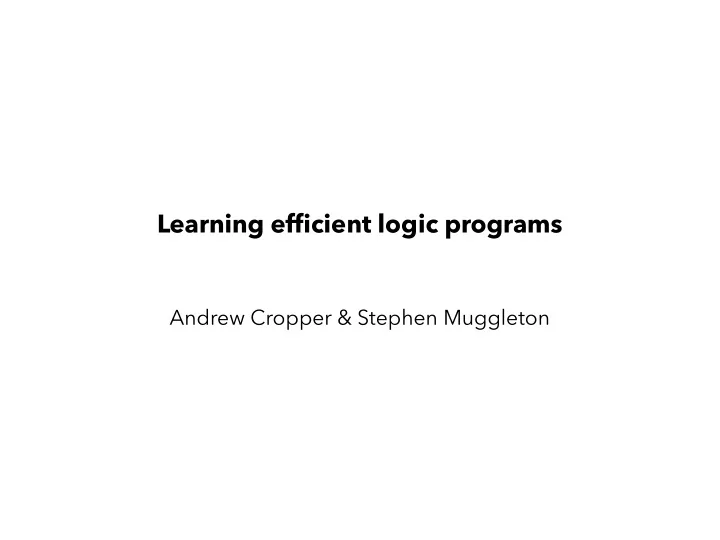

Learning efficient logic programs Andrew Cropper & Stephen Muggleton
Input Output [s,h,e,e,p] e [a,l,p,a,c,a] a [c,h,i,c,k,e,n] ?
Input Output [s,h,e,e,p] e [a,l,p,a,c,a] a [c,h,i,c,k,e,n] c
%% metagol f(A,B):-head(A,B),tail(A,C),element(C,B). f(A,B):-tail(A,C),f(C,B).
%% alternative f(A,B):-mergesort(A,C),f1(C,B). f1(A,B):-head(A,B),tail(A,C),head(C,B). f1(A,B):-tail(A,C),f1(C,B).
Idea Input - examples E - background knowledge B - cost : ︎ Program × Example ︎ → N
Idea 1. Learn any program H 2. Repeat while possible: a. Learn program H’ where max_cost(H’,E) < max_cost(H,E) b. H=H’ 3. Return H
Metagol prove([],P,P). prove([Atom|Atoms],P1,P2):- prove_aux(Atom,P1,P3), prove(Atoms,P3,P2). prove_aux(Atom,P,P):- call(Atom). prove_aux(Atom,P1,P2):- metarule(Atom,Body,Subs), save(Subs,P1,P3), prove(Body,P3,P2).
Metagol prove([],P,P). prove([Atom|Atoms],P1,P2):- prove_aux(Atom,P1,P3), prove(Atoms,P3,P2). prove_aux(Atom,P,P):- call(Atom). prove_aux(Atom,P1,P2):- metarule(Atom,Body,Subs), save(Subs,P1,P3), prove(Body,P3,P2).
Metagol prove([],P,P). prove([Atom|Atoms],P1,P2):- prove_aux(Atom,P1,P3), prove(Atoms,P3,P2). prove_aux(Atom,P,P):- call(Atom). prove_aux(Atom,P1,P2):- metarule(Atom,Body,Subs), save(Subs,P1,P3), prove(Body,P3,P2).
Metagol prove([],P,P). prove([Atom|Atoms],P1,P2):- prove_aux(Atom,P1,P3), prove(Atoms,P3,P2). prove_aux(Atom,P,P):- call(Atom). prove_aux(Atom,P1,P2):- metarule(Atom,Body,Subs), save(Subs,P1,P3), prove(Body,P3,P2).
Metaopt prove([],P,P,C,C). prove([Atom|Atoms],P1,P2,C1,C2):- prove_aux(Atom,P1,P3,C1,C3), prove(Atoms,P3,P2,C3,C2). prove_aux(Atom,P,P,C1,C2):- pos_cost(Atom,Cost). C2 is C1+Cost, bound(MaxCost), C2 < MaxCost. prove_aux(Atom,P1,P2,C1,C2):- metarule(Atom,Body,Subs), save(Subs,P1,P3), C3 is C1+1, prove(Body,P3,P2,C3,C2).
Metaopt prove([],P,P,C,C). prove([Atom|Atoms],P1,P2,C1,C2):- prove_aux(Atom,P1,P3,C1,C3), prove(Atoms,P3,P2,C3,C2). prove_aux(Atom,P,P,C1,C2):- pos_cost(Atom,Cost). C2 is C1+Cost, bound(MaxCost), C2 < MaxCost. prove_aux(Atom,P1,P2,C1,C2):- metarule(Atom,Body,Subs), save(Subs,P1,P3), C3 is C1+1, prove(Body,P3,P2,C3,C2).
Metaopt prove([],P,P,C,C). prove([Atom|Atoms],P1,P2,C1,C2):- prove_aux(Atom,P1,P3,C1,C3), prove(Atoms,P3,P2,C3,C2). prove_aux(Atom,P,P,C1,C2):- pos_cost(Atom,Cost). C2 is C1+Cost, bound(MaxCost), C2 < MaxCost. prove_aux(Atom,P1,P2,C1,C2):- metarule(Atom,Body,Subs), save(Subs,P1,P3), C3 is C1+1, prove(Body,P3,P2,C3,C2).
Iterative descent 1. Learn any program H with minimal clauses 2. Repeat while possible: a. Learn program H’ where max_cost(H’,E) < max_cost(H,E) b. H=H’ 3. Return H
Metaopt prunes as it learns
Tree cost Positive examples: size of the leftmost successful branch
Tree cost Positive examples: size of the leftmost successful branch pos_cost(Atom,Cost):- statistics(inferences,I1), call(Atom), statistics(inferences,I2), Cost is I2-I1.
Tree cost Negative examples: size of the finitely-failed SLD-tree
Tree cost Negative examples: size of the finitely-failed SLD-tree neg_cost(Atom,Cost):- statistics(inferences,I1), \+ call(Atom), statistics(inferences,I2), Cost is I2-I1.
Tree cost • any arity logics • no user-supplied costs • backtracking and non-determinism
Input Output [s,h,e,e,p] e [a,l,p,a,c,a] a [c,h,i,c,k,e,n] c
Input Output [s,h,e,e,p] e [a,l,p,a,c,a] a [c,h,i,c,k,e,n] c f(A,B):-mergesort(A,C),f1(C,B). f1(A,B):-head(A,B),tail(A,C),head(C,B). f1(A,B):-tail(A,C),f1(C,B).
Convergence: program tree costs
Convergence: program running times
Performance
Performance
Resource complexity L 1 L 2 L 2 L 1 Initial state Final state
Input Output My name is John. John My name is Bill. Bill My name is Josh. Josh My name is Albert. Albert My name is Richard. Richard
%% metagol f(A,B):-tail(A,C),f1(C,B). f1(A,B):-dropLast(A,C),f2(C,B). f2(A,B):-dropWhile(A,B,not_uppercase).
%% metagol unfolded f(A,B):- tail(A,C), dropLast(C,D), dropWhile(D,B,not_uppercase).
% metagolO f(A,B):-f1(A,C),f4(C,B). f1(A,B):-f2(A,C),f3(C,B). f2(A,B):-filter(A,B,is_letter). f3(A,B):-dropWhile(A,B,is_uppercase). f4(A,B):-dropWhile(A,B,not_uppercase).
% metagolO unfolded f(A,B):- filter(A,C,is_letter). dropWhile(C,D,is_uppercase), dropWhile(D,B,not_uppercase).
% metaopt f(A,B):-tail(A,C),f1(C,B). f1(A,B):-f2(A,C),dropLast(C,B). f2(A,B):-f3(A,C),f3(C,B). f3(A,B):-tail(A,C),f4(C,B). f4(A,B):-f5(A,C),f5(C,B). f5(A,B):-tail(A,C),tail(C,B).
% metaopt unfolded f(A,B):- tail(A,C), tail(C,D), tail(D,E), tail(E,F), tail(F,G), tail(G,H), tail(H,I), tail(I,J), tail(J,K), tail(K,L), tail(L,M), dropLast(M,B).
% metaopt unfolded f(A,B):- tail(A,C), tail(C,D), tail(D,E), tail(E,F), tail(F,G), tail(G,H), tail(H,I), tail(I,J), tail(J,K), tail(K,L), tail(L,M), dropLast(M,B). does this last
Todo • Study complexity of Metaopt variants • Characterise complexity of learned programs • Discover new efficient algorithms
Recommend
More recommend